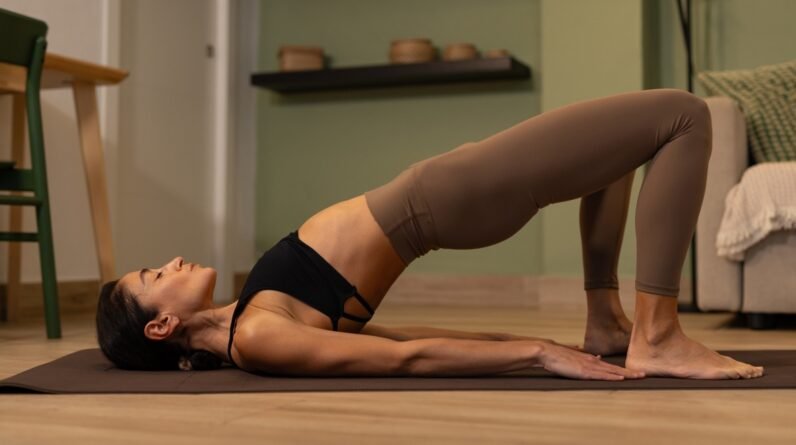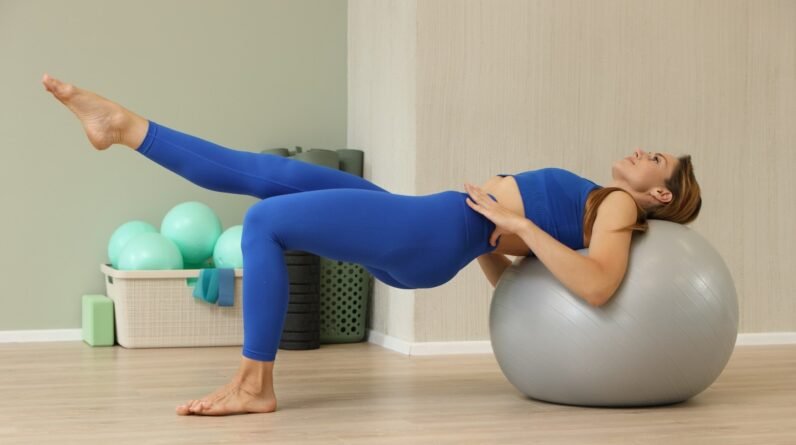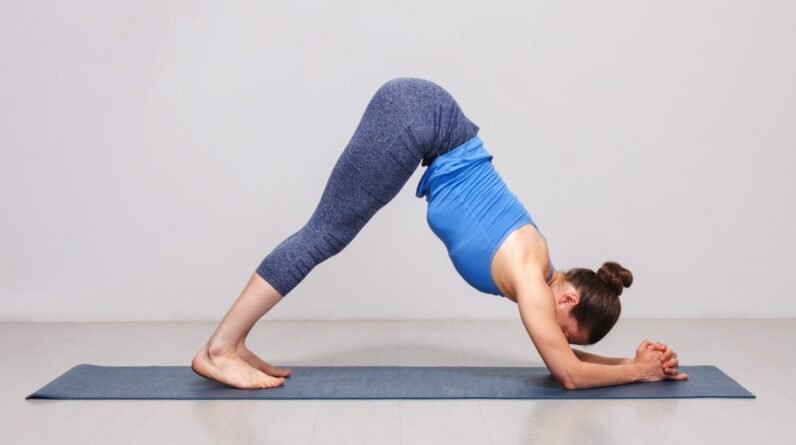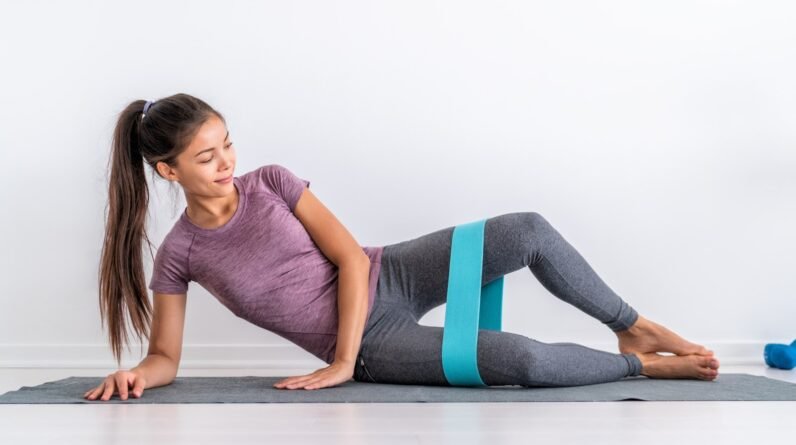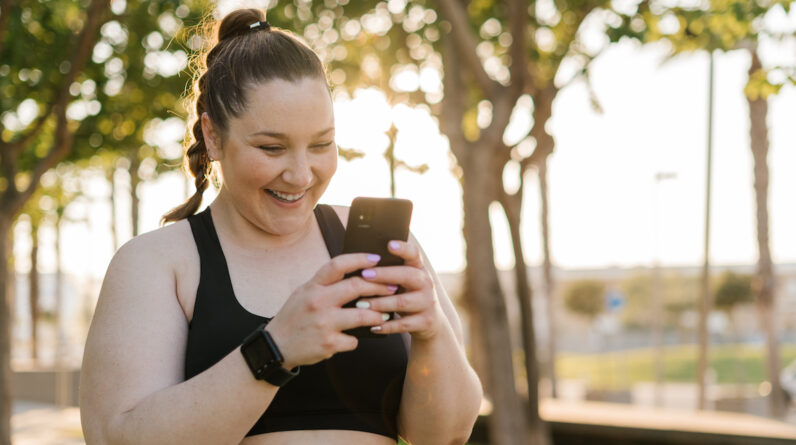
Welcome to the era of fitness at your fingertips. Finding the best workout apps has never been easier, making it a breeze to break a sweat from the comfort of your home. Thanks to advances in technology, you can bid farewell to crowded gyms and dirty equipment (ew) and get moving wherever you want to, without having to sacrifice any part of your normal workout routine.
That said, not all workout apps are made equal. Depending on your exercise style, fitness level, and personal preferences, some workout apps are bound to be your new gym buddy, while others aren’t worth breaking a sweat over at all. Below are the apps worth downloading based on activity, price point, features, and more, so you can get working out ASAP.
Experts In This Article
- Bianca Vesco, Nashville-based certified personal trainer and fitness instructor
The best workout apps, at a glance:
What to look for in a workout app
Price
First things first: always try the app out first before you pay anything. “If you’re not using an app that’s user-friendly, with coaches that motivate you, you’re probably not going to open it very often, right?” says Bianca Vesco, a Nashville-based certified personal trainer and fitness instructor. You have to find an app that feels easy to navigate and use, gets you excited to move around, and holds you accountable. Most apps offer free trials, so give them a whirl before you commit.
Instruction
From there, Vesco suggests looking into the instructors on the app. “Make sure that the individuals teaching on the workout app are educated professionals and not just random people filling a roster of spots.” Think about paying for a workout class in person—you wouldn’t be pleased to find out that your Pilates or OrangeTheory instructor wasn’t certified or skilled in what they were teaching you, would you?
Personal fitness goals
When you’re browsing through different apps, think about what you specifically are looking for. “Get serious about what you’re looking to get out of your fitness app and coaches,” Vesco says, which starts with, “considering what types of workouts you enjoy most and align most with your fitness goals.”
And of course, if you’re using an app as a supplemental tool to other workouts or fitness programs, make sure the app complements what you’re already doing. “You want to be consistent in your training, but still enjoy some variety, too—and apps are a great way to get the best of both,” says Vesco. Or, if you’re planning to use a fitness app as your primary workout routine or want to try something new, Vesco says one thing is the most important—having fun. “Never tried dance cardio? There’s an app for that so you can try it in the comfort of your own home. Scared to do yoga? Find a beginners’ class or yoga app and try it in your living room without worrying about being nervous in a group setting,” Vesco says. The bottom line? “Find the app that feels like you, and the results will follow.”
Best workout apps
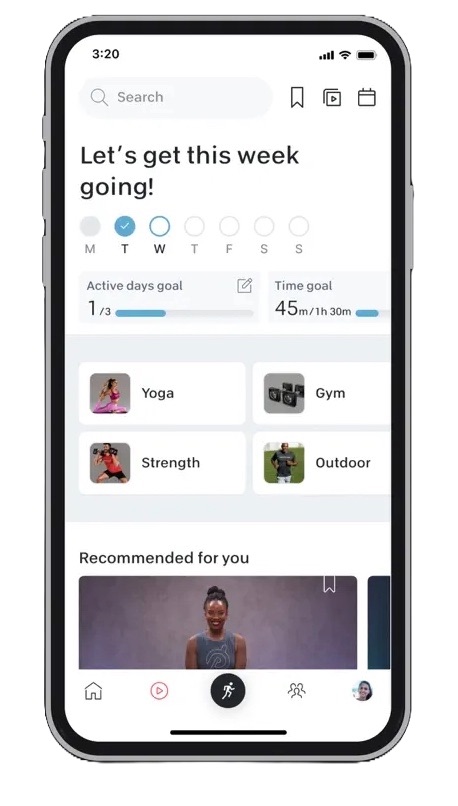
Best variety: Peloton — $13.00
Cost: $13/month for the standard app or $24/month for the premium version; annual equivalents drop to $11/month for the standard app ($129/year) or $20/month for the premium version ($240/year)
The Peloton app, hailed as your “on-demand fitness companion,” lives up to its reputation with a diverse array of content. Whether you’re into strength training, stretching, yoga, cardio, running, or even rowing, Peloton has you covered. The best part? You don’t need any Peloton equipment to access the platform, (though pairing options are available if you have them.)
Connect the app with your Apple Watch to keep tabs on your stats and crush your fitness goals. You can stream Peloton classes on pretty much anything—your phone, tablet, computer, or even kick back and enjoy them on your TV. So, whether you’re at home or out and about, the Peloton app’s got your back for a sweat session.
Free trial? Yes
- Diverse content
- Free trial
- No equipment necessary
- Device compatibility and Apple Watch integration
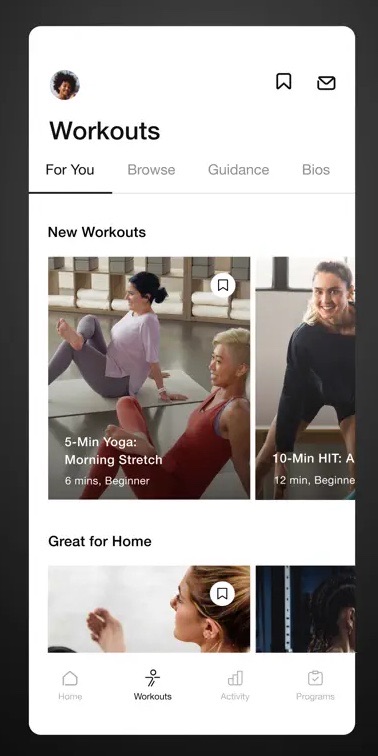
Best free app: Nike Training Club
Cost: Free
For a free app with high-quality classes and lots of options, the Nike Training Club is a great option—there’s new content uploaded each day in a variety of categories, like HIIT, yoga, and more. Trainers, athletes, and wellness experts create the app’s content and guide other topics like nutrition, sleep, mindfulness, and recovery. This makes it a holistic wellness app versus just a workout app, and since it’s free, it truly is a wealth of accessible knowledge for anyone, beginners and experts alike.
When you first download the app, you’ll take a quiz about your interests and what type of exercise routine and schedule you’d like. From there, you’ll get personalized suggestions for training programs. It’s personal training without being super expensive or time-consuming.
Free trial? N/A
- Diverse content spanning workouts and holistic wellness advice
- Free
- Expert-curated content
- Customizable plans
- Less extensive personalization and tracking
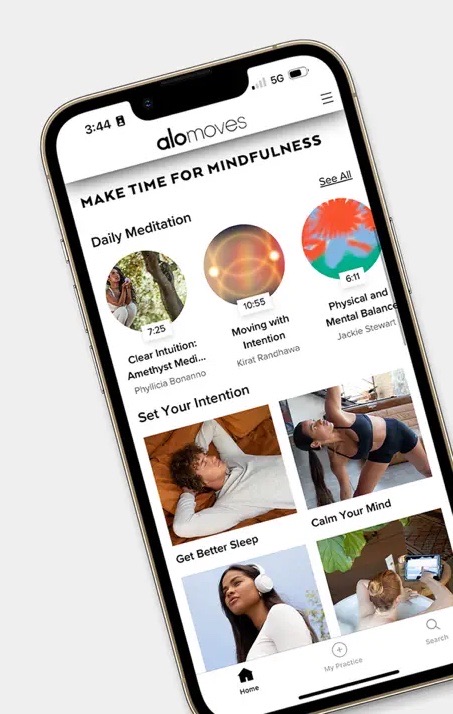
Best user experience: Alo Moves — $13.00
Cost: $13/month or $130/year
Alo might be best known for its beautiful workout clothing, but the company’s fitness app also has a seamless, fun user experience chock-full of yoga, barre, and other workout content. The app has a 14-day free trial so you can see if its content is right for you. We love that you can download classes for offline viewing, which is great for practicing mindfulness, even if you’re traveling or off the grid.
Note that the Alo Moves app is currently only available for Apple devices, so if you’re an Android user, this one likely isn’t the best fit for you—and it’s not yet able to sync up with your Apple Watch, so if tracking your metrics that way is important for you, another app might be a better choice.
Free trial? Yes (14 days)
- Specialized content
- Beautiful interface
- High-quality instruction and structured programs
- Offline access
- Free trial
- Pricey
- Only available on Apple devices (but not compatible with Apple watch)
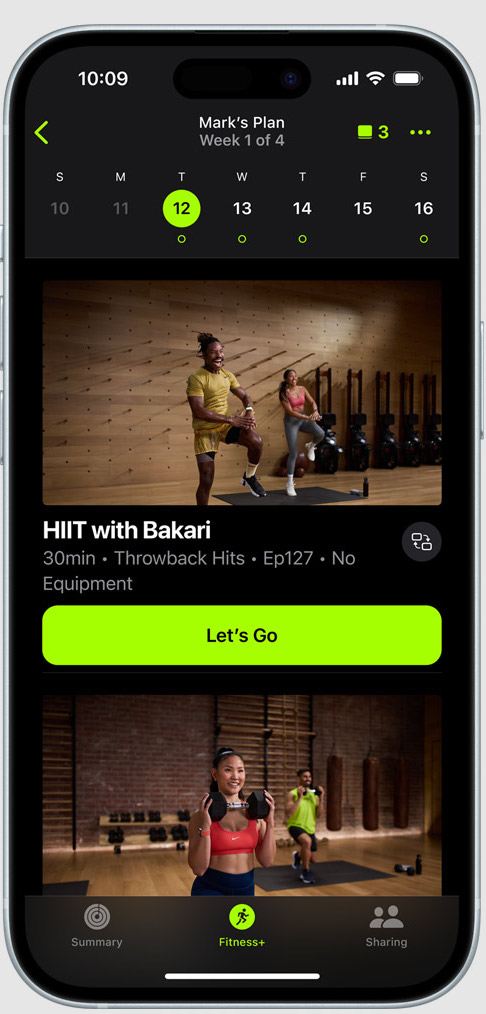
Best for tracking metrics: Apple Fitness — $10.00
Cost: $10/month or $80/year
If you’re someone with all the Apple devices, the Apple Fitness app might be perfect for you. It’s available on your iPhone, iPad, Apple TV, and Apple Watch. The app offers content across 12 workout types from HIIT to yoga, and also offers meditation content—we love that there’s a variety of expertise levels and workout lengths available, from as quick as five minutes to as long as 45. Perhaps best of all, your workouts will sync up with real-time metrics from your Apple Watch, so you can see metrics like your heart rate and activity rings right on your screen.
If you’d like, you can work out without any equipment by taking a guided walk or run with your Apple Watch and Bluetooth headphones. You can also share the app with up to five family members, so it’s a good one for multiple users hoping to work out together without adding on extra costs.
Free trial? Yes (1 month for new subscribers, 3 months when you purchase a new Apple Device)
- Integration with the entire Apple ecosystem, including wearables
- Diverse content options
- Free trial
- Interactive features and personalized recommendations
- Can be shared with up to five family members
- Pricey
- Only compatible with Apple products
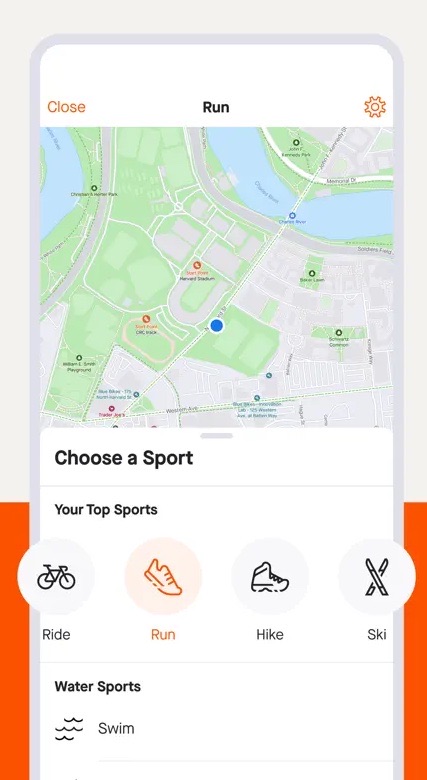
Best for running and cycling: Strava — $12.00
Cost: $12/month or $80/year
Strava, a powerhouse in the running and cycling realm, takes tracking to the next level with its comprehensive metrics system. Seamlessly syncing with your mobile phone, GPS, watch, and heart monitor, Strava records an abundance of performance data for a thorough analysis of your workouts.
But it’s not just about the numbers. Strava brings a social twist to your fitness journey. The app’s networking feature allows you to connect with fellow athletes, making it an ideal platform for friends on a joint fitness or running adventure—there are hundreds of virtual clubs you can join on the app.
One of Strava’s best features for runners and cyclists is the Beacon, an option to share your real-time location with people of your choosing so you have peace of mind while you’re out on a trail or in the woods. And if you’re competitive, this app is a great motivator thanks to Segments, which mark popular stretches of road or trail (like your favorite local climb) and create a leaderboard of times set by every Strava athlete who has been there before. The Segments are also a great way for you to discover new places to exercise, especially if you’re traveling.
Free trial? Yes, but without all settings available to try (1 month)
- Comprehensive metrics and tracking
- Excellent community and social networking
- Device compatibility
- Beacon feature and Segment competitions
- Free trial
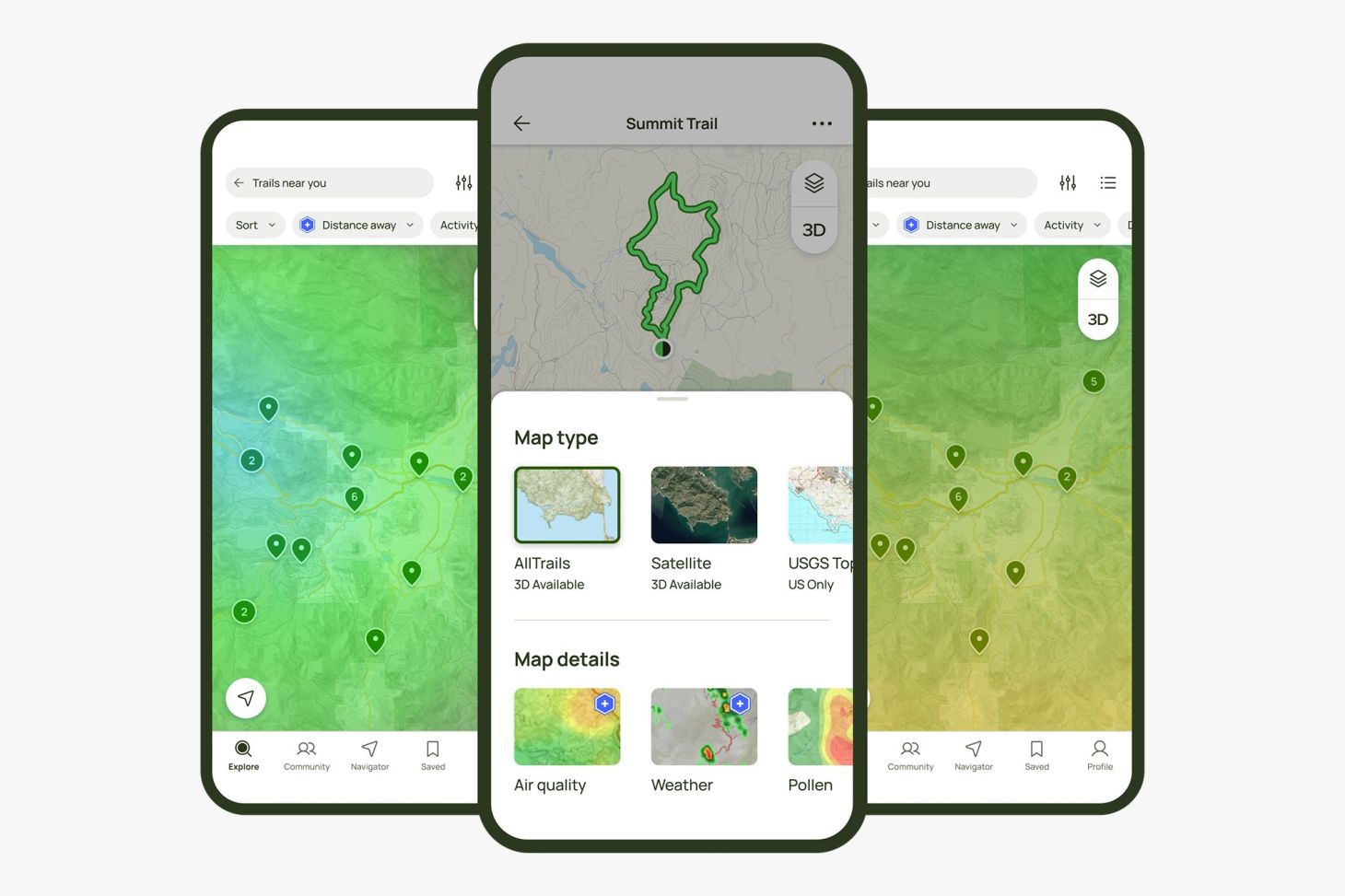
Best for hiking: AllTrails+ — $3.00
Cost: $3/month or $35/year
If you hike, you’re likely familiar with AllTrails, the go-to hiking app for discovering and tracking new trails. But for those who want to take their hiking game to the next level, we recommend AllTrails+, the premium subscription service that offers superior perks from its free counterpart, including offline custom maps, access to 200+ guides, and enhanced map layers. It’s the VIP pass to an unparalleled hiking experience, allowing you to venture off the beaten path with total confidence. The best part? It’s only $35 a year, which comes out to about $3/month.
Free Trial? Yes—one week
- Affordable
- Extensive trail database and tracking features
- Excellent community and social networking
- Solely a hiking app
- Limited personalized metrics
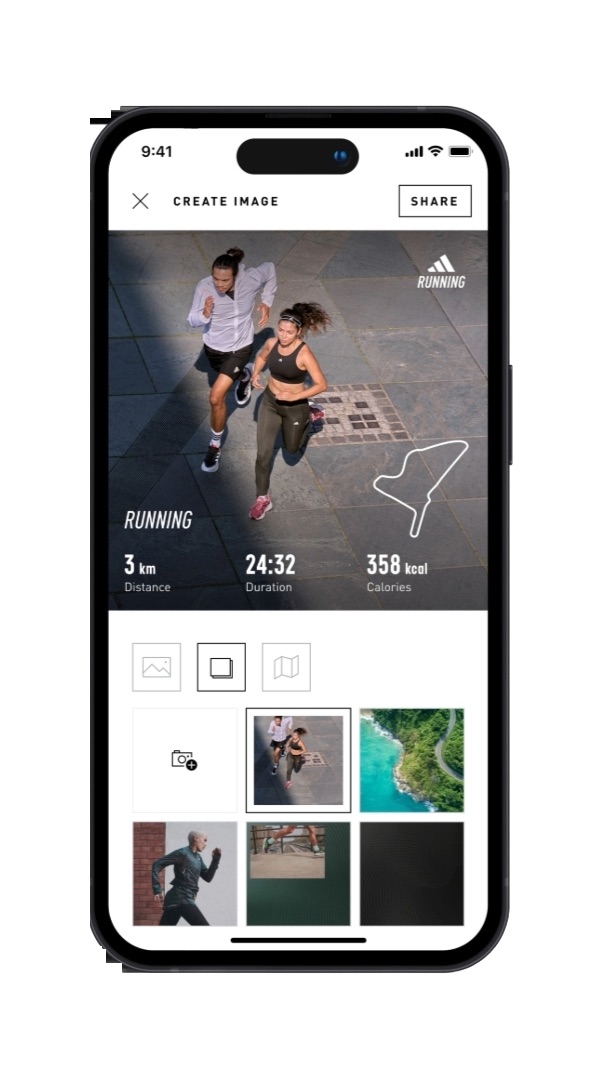
Most personalized: Adidas Running — $10.00
Cost: Basic plan is free; for premium plans, cost is $10/per month or $50/year for premium
After taking a short fitness evaluation, the Adidas Training app will create a plan for you to help achieve your unique wellness goals. You can choose how long you want your plan to be and how many days you want to train. The app has plans available for every level of expertise, and your plan will be tailored to what you describe during the evaluation.
The Adidas app has a community component, but what’s most exciting about it is the chance to earn rewards. The more you exercise and use the app, the more you can earn. When you run, walk, hike, or cycle and record it in the app, as well as do things like joining challenges, taking part in virtual races, or setting new fitness goals, you can earn points that you can redeem for prizes.
Free trial? No
- User-friendly interface
- Customizable training plans
- Real-time stats
- Opportunity to earn rewards
- Basic plan is free
- Limited workout variety—mostly focused on running
- No free trial
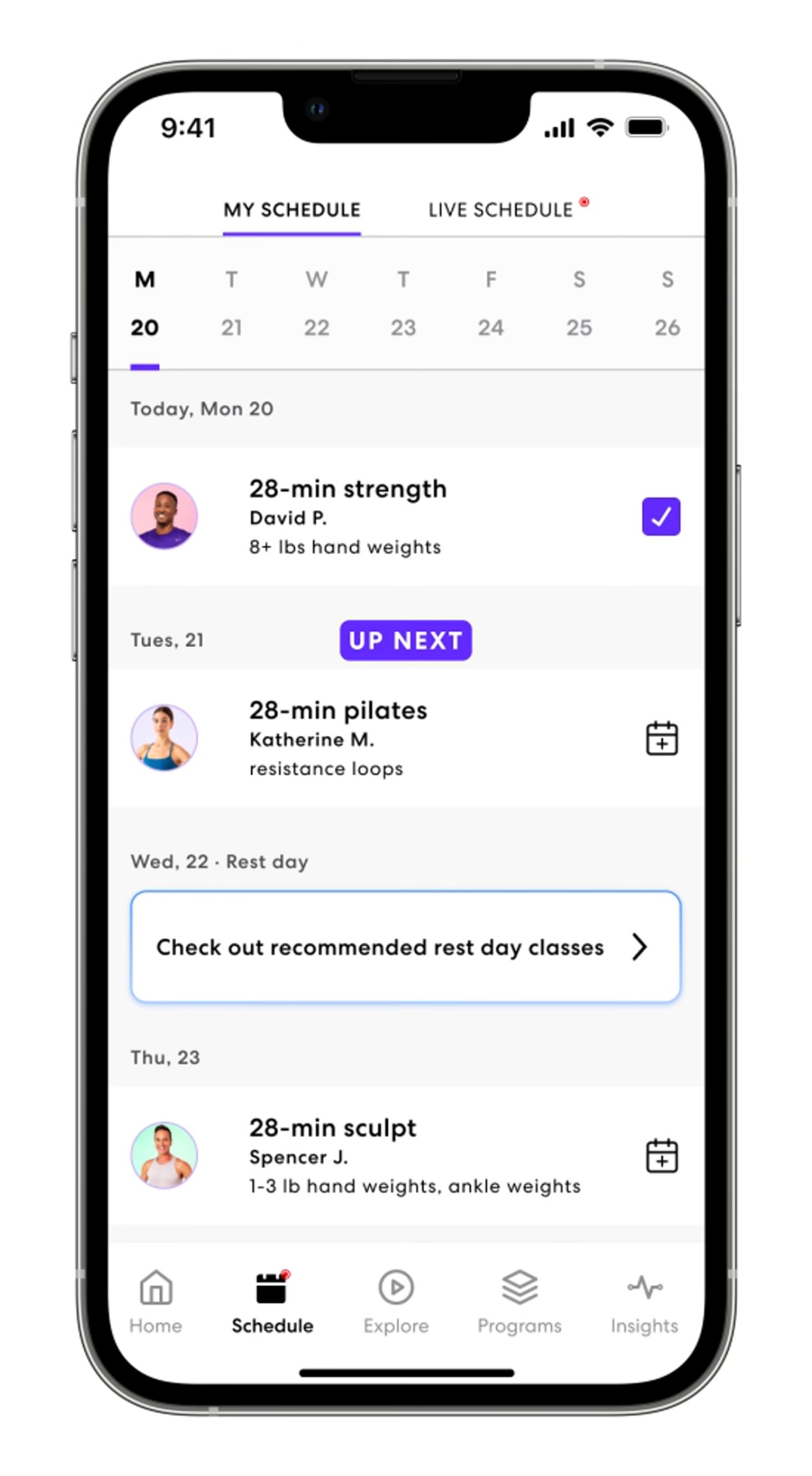
Best for home workouts: Obé Fitness — $25.00
Cost: $25/month or $170/year
Obé is probably the most beautiful and dreamy fitness app, but don’t underestimate the power of its classes. With over 20 class types to choose from and over 10,000 on-demand programs and live options, there’s something for everyone. You can take advantage of all the app has to offer, and if you decide you want more personalized or customized training, you can even add personal training to your membership and be matched with a 1:1 coach to support you in meeting your goals.
Free trial? Yes—one week
- Diverse content
- Beautiful user interface
- Personalized training with an option for 1:1 coaching
- Free trial
FAQs
Should I pay for a fitness app?
It depends on your fitness priorities. While free options exist, paid apps often provide better experiences with personalized plans, expert guidance, and diverse workouts. If accountability and structured programs matter to you, a paid app might be worth it, offering access to top-notch instructors and a supportive community. Ultimately, the decision hinges on your fitness goals and how much you value a premium, curated fitness experience.
Are workout apps worth it?
Workout apps are really helpful for two reasons: accessibility and variety. “There is truly something for everyone, everywhere—no matter their fitness level or what they have access to, apps make exercising at home more fun and feasible,” Vesco says. If you aren’t comfortable or confident planning your own workouts, apps are an incredible tool to try out different exercise routines.
However, if you’re looking for a highly personalized experience, workout apps might not be the right fit for you. “Since classes on fitness apps are designed for a more general group of people, if you’re dealing with injuries or imbalances, or you have specific questions or accommodations, you’re typically on your own,” Vesco says. And if you’re an athlete with particular skills looking to get stronger or improve in a specific area, unless those goals match up with a workshop or app, you’re likely to need a personal trainer or specialist to help you get results.
Suffice to say, it depends. There is a nice level of accountability that comes with shorter classes right in the palm of your hand. “Does a 20-minute at-home workout video sound more appealing and realistic for you than a two-to-three hour process of going to the gym, working out, and coming home?” asks Vesco. If the answer is yes, an app can help you commit to a movement routine and stay consistent—and even if all it entails is a simple walk, it may be worth trying.
Are fitness apps safe?
Rest assured, the majority of reputable workout apps prioritize user safety. The best fitness apps make sure your info stays safe and sound with tight security measures. Before you hit download, sneak a peek at the reviews, ratings, and their privacy vibes to see if they’re legit.
Oh, and don’t forget to update your apps regularly to benefit from the latest security patches. If an app requires payment, use trusted payment methods for added security. Overall, with due diligence and choosing from recognized platforms, workout apps can be a safe and effective tool to enhance your fitness journey.



